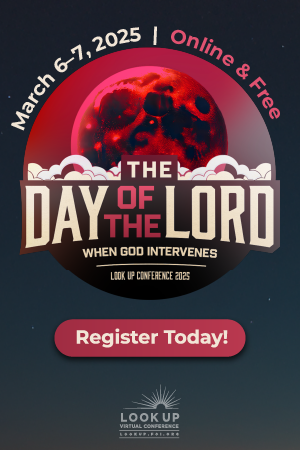Warning: God Is a Jealous God! Ezekiel 36:1–7
Of the many imaginative discourses offered by the Talmudic rabbis is one based on Genesis 28:12.
Rabbi Berechiah said: “When Jacob dreamed of the ladder ascending into Heaven, he saw Babylon, Persia, Greece and Rome ascend and fall.” Then God said: “Jacob, ascend thou now.” But Jacob hesitated and asked: “Will I not fall, O Lord, as they have fallen?” The Lord replied: “You shall not fall.” Nevertheless, Jacob still disbelieved and was in no hurry to ascend. God then permitted other non-Jewish nations to ascend to power while Israel continued to be the victim of harsh treatment. Jacob then cried out: “Have I lost for my descendants the chance for all time to ascend?” “Nay,” answered God, “in the end your people too will ascend and will not fall” (Pesikta Rabbat, 23).
This rabbinic tale was designed to encourage oppressed Israel. It simply states that the Gentile nations that rise to power do so only because the almighty God has so decreed. However, in the end Israel will be fully restored to its land forever. Until such time, Israel will be accosted by enemies who will mistreat them and desire to occupy their land.
The despondent Jewish captives living along the mud flats of the Kabar canal in Babylon near the end of the sixth century B.C. wondered if God had utterly abandoned them. In their midst was a fellow captive named Ezekiel. In chapter 36 of his book, this young priest was suddenly seized with an unusual excitement as he prophesied. As recorded in the first seven verses, he uttered three declarations from the sovereign God concerning what He will do to Israel’s enemies. The first declaration is, “[I have] spoken against the residue of the nations, and against all Edom” (v. 5). The second is, “I have spoken in my jealousy and in my fury” (v. 6). The third is, “I have lifted up mine hand…the nations…shall bear their shame” (v. 7). These words of judgment that would come upon the nations were not limited to the generation of Ezekiel’s day. Rather, this prophecy was designed to warn Israel’s present-day enemies—those who are laying claim to the land of Israel as their own.
A Declaration of Judgment on the Enemy (vv. 1–5)
Ezekiel was carried into Babylonian captivity with King Jehoiachin in 597 B.C. He was raised up by God to keep hope alive among his fellow exiles. Under the inspiration of the Holy Spirit, he prophesied God’s indictments against Edom, who had maliciously rejoiced at the devastation of Jerusalem and Judah (35:5, 15). They had taken possession of the mountainous parts of Judæa and all the fortresses that commanded the country. They intended to prevent any reestablishment of Israel, if the Jewish exiles should ever return. The “mountains of Israel” (v. 1) was a common expression for the people and the land of Israel (see Ezek. 33:28; 37:22). The prediction is delivered in contrast to “Mount Seir,” representing Edom. Mount Seir is the territory east of the Arabah, extending from the southern end of the Dead Sea to the Gulf of Aqaba. The Edomites, descendants of Esau (Gen. 36:1–17), inhabited this rugged mountainous area for a while. In biblical times the King’s Highway, a major caravan route, passed along the eastern plateau of Mount Seir (Num. 20:14–18). Israel desired to travel on this pathway en route to the Promised Land, but Edom refused them passage (Num. 20:20–21). Although there was contention between the descendants of Esau and Jacob, God commanded Israel not to abhor his Edomite brother (Dt. 23:7), notwithstanding Edom’s refusal to allow them passage. However, the descendants of Esau did not return the good will. Through the centuries, the Edomites have had a perpetual, even satanic hatred toward the people of Israel. Eventually their animosity had to be challenged. King David conquered Edom, resulting in a considerable slaughter (2 Sam. 8:13). Later King Joram defeated Edom in a great battle (2 Ki. 8:4–27). King Amaziah invaded Edom and slew 10,000 people in the Valley of Salt (2 Chr. 25:11–12). By 736 B.C., Edom was reduced to a vassal state of Assyria as a result of the campaigns of Tiglath-Pileser III. Consequently, Edom came under the rule of the Babylonians. Still Edom continued in their malicious disposition toward Israel. This was evident by their participation in the destruction of Judah and Jerusalem with Nebuchadnezzar in 587 B.C. Because of this perpetual hatred, God has judged them to never-ending desolation (Jer. 49:7–22).
In Ezekiel 36:2 the enemy fancied, “the ancient high places are ours in possession.” These high places are probably “the everlasting hills” mentioned in Genesis 49:26 and Deuteronomy 33:15. These high mountains in the land of Israel, which included the Temple Mount, were symbolic monuments to the irrevocable blessings connected with the Abrahamic Covenant (Gen. 12:1–3). The enemy’s presumption that they could take that which was not given to them is the height of insult to the integrity of God’s promise to Israel.
The phrase in verse 3, “ye are taken up in the lips of talkers, and are an infamy of the people,” refers to Edom’s slander against Israel. It was coupled with coveting Israel’s inheritance. Edom’s vindictive words defamed God as impotent and unable to save His people. “The residue of the nations” (v. 4) was the remnant from surrounding nations that also mocked Israel in its desolation (Ps. 79:4). Like Edom, those nations concluded that the land was theirs, and so they took it with “the joy of all their heart, with despiteful minds” (v. 5). This outrage caused Ezekiel’s indignation.
A Declaration of God’s Jealousy for Israel (vv. 5–6)
“Therefore,” Ezekiel thundered, God has spoken in his jealousy and fury against Edom. A principle of the Old Testament is that God is a jealous God (Ex. 34:14). He shares His worship with no other. Israel was to be faithful only to their true God. The intensity of God’s wrath against Edom is pictured in the case of a husband who holds his wife to himself but is permitted to kill her and her paramour in the event of adultery. On the grounds of the covenant relationship, God and Israel are often pictured in the marriage relationship (cp. Jer. 3:14; Hos. 2:19), in which God loves Israel with an everlasting love (Jer. 31:3). In this light, God’s jealousy is His righteous wrath against all violators of Israel and the land.
A Declaration of Perpetual Shame on Israel’s Enemies (v. 7)
Because Israel had to bear the shame heaped upon them by the animosity of the nations (Ps. 123:3–4), the Lord, in divine retribution, will one day make the nations bear their own contempt and reproach. The shame that Israel had to bear from those nations was only for a time. The shame that will come upon the nations is eternal. The certainty of their punishment is represented by the Lord’s lifting up His hand in a solemn oath (v. 7).
During the fifth century B.C., Israel fell into Arab hands. By the third century B.C., it was overrun by the Nabatæans. In the centuries that followed, many nations marched into Judah. There they eventually were subdued by the Israelite forces under Judas Maccabee (1 Macc., v. 65).
The prophecy of Ezekiel was primarily upon Edom; however, the transition from judgment on Edom to judgment of the nations is especially noted in verse 5. The statements are addressed to all oppressive nations as a whole. Therefore, according to some commentators, Edom is a type of Israel’s bitter enemies throughout the ages—those who have slandered God by trying to take over the Promised Land. Babylonians, Persians, Romans, Christians, Moslems, and many others have, at one time or another, laid claim to the mountains of Israel as their possession. Their audacity was viewed by God as a sin against Himself.
The prophecy of Ezekiel 36:1–7 is a solemn warning and is pertinent to the current state of affairs in Israel. Once again the enemy has said, “Aha, even the ancient high places are ours in possession” (v. 2). In this present dispensation of grace, the Arabs of the world are not enemies. Christ died for their sins and wants them to experience His love through salvation. However, because they—or any group of people—embrace and advocate a philosophical/religious position designed to steal the Promised Land from the Jewish people, they are considered to be Israel’s enemies.
Like Edom and the remnant of the nations, the PLO has laid claim to the mountains of Israel. The first article of their stated goals reads:
Palestine is the homeland of the Palestinian Arab people and an integral part of the great Arab homeland, and the people of Palestine are a part of the Arab nation.
Interestingly, in 1968 the word charter in the official PLO pact was changed to the word covenant to give their document a supposed national sanctity.
The Arab world, as represented by statements from a Jordanian official in 1991, has also laid claim to the mountains of Israel.
We know that our enemies are Jews, who are also the sworn enemy of all humanity….We can say that the whole of Palestine, from the [Mediterranean] Sea to the [Jordan] River is Islamic Arab land, and that the Jews have no right at all to exist in Palestine (Ahmad al-Kawhafi, Jordanian Parliament).
Reflecting on recent developments, the take-over of the mountains, hills, and valleys of Israel has been systematic. Bethlehem, the city reminiscent of the coming of the Messiah, is no longer in Jewish hands. The strategic city of Jericho was given over to the enemy. Recently Hebron, the patriarchal city, was surrendered. All that remains is the heart of Israel. Yasser Arafat was recently quoted in a Paris newspaper, “I see the light at the end of the tunnel.” Then, with a smile on his face, he went on: “I can even get a glimpse of Jerusalem.” This contempt for God’s program will heap upon Israel’s present-day enemies the same kind of condemnation that fell upon Edom.
Therefore, thus saith the Lord God: Surely in the fire of my jealousy have I spoken against the residue of the nations, and against all Edom, who have appointed my land into their possession with the joy of all their heart, with despiteful minds, to cast it out for a prey (Ezek. 36:5).
True believers, like Ezekiel, are needed to shout to the usurpers of Israel and all their sympathizers in the world: “Warning: God is a jealous God!”







